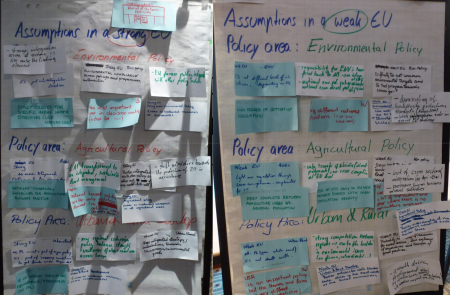
Resource description:
Participatory scenarios development and planning
In the recently published IPBES assessment on scenarios and models, the uses of scenarios for biodiversity and ecosystem services where summarized. They serve for awareness raising and agenda setting, and assist in policy and more broadly decision making design under uncertainty. They can be used to assess consequences of implementing certain pathways and associated measures as well as evaluating them. But there are certain prerequisites for scenarios to be useful. One prerequisite is to ensure that the scenario approach employed is matched carefully to the needs of each particular policy or decision context. This is best achieved, when the scenarios are developed in a participatory manner.
If you are interested in or planning to use participatory scenario development and planning, CoKnow can help you to ensure a successful process together with your stakeholders. Together we can:
• discuss available methods and tools against the background of your knowledge and decision making needs as well as resources available, to answer the question: which method is most useful in your case.
• tailor the most suitable methods to your situation and develop a thorough plan for implementing a participatory scenarios development and planning process that yields most useful outcome to you and your stakeholders.
• implement the process, from identifying and engaging all relevant stakeholders, organize exciting scenario workshops and co-produce results and recommendations.
• evaluate and document the process to ensure outcomes are relevant, credible and legitimate.
Author/Contact:
My name is Jennifer Hauck and with CoKnow Consulting I am offering my over 10 years of experience in building capacity for inter- and transdisciplinary processes. I support you and your stakeholders to co-produce knowledge and co-design solutions for sustainability!
More specifically I support you in overcoming barriers of inter- and transdisciplinary cooperation such as language barriers between different scientific disciplines and between science and practice. I help to explore different worldviews, goals and motivations, integrate different working styles, and planning horizons of all partners involved.
Your benefits will be an easier and less cost intensive organization of processes, minimizing risks of failure to co-produce relevant knowledge and ensure the co-design of useful solutions for sustainability. Of course, the goal of CoKnow is also to develop your capacities to organize inter- and transdisciplinary processes yourself.
Please do not hesitate to get in contact: jennifer.hauck (at) coknow.de
Advantages:
- State-of-the art methodological knowledge, coupled with ample practical experience
- Co-designed scenario approaches to fit your needs
- Learn how to implement a participatory scenarios development and planning approach
Uses of this resource:
Use participatory scenarios development and planning for awareness raising and agenda setting, policy and more broadly decision making design under uncertainty. Use tailored approaches to assess consequences of implementing certain pathways and associated measures as well as evaluating them.
DOI reference:
Hagemann, N., Gawel, E., Purkus, A., Pannicke, N., Hauck, J., (2016): Possible futures towards a wood-based bioeconomy: a scenario analysis for Germany. Sustainability 8 (1), art. 98
Priess, J.A., Hauck, J., (2014): Integrative scenario development. Ecol. Soc. 19 (1), Art. 12
Hauck, J., Priess, J.A., (2013): „The most likely future isn't“: Landnutzungsszenarien für Mitteldeutschland Raumforschung und Raumordnung 71 (5), 397 – 411.
Licence:
- Commercial
Development stage:
- Full, working product
Quality assurance:
- Scientific peer review
- Professional references